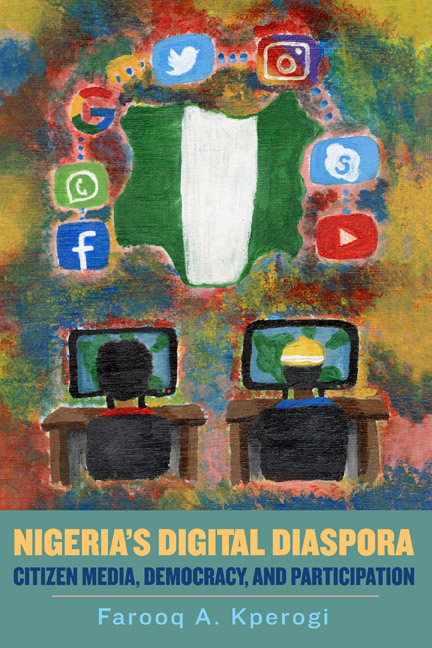Book contents
- Frontmatter
- Dedication
- Contents
- Acknowledgments
- Introduction
- 1 Citizen and Alternative Journalism: Mapping the Conceptual Contours
- 2 The Nigerian Press: From Colonial Evangelism to Guerrilla Journalism
- 3 The Nigerian Digital Diasporic Public Sphere
- 4 Profiles of Diasporic Citizen Media Sites
- 5 From the Diaspora to the Homeland: Role Reversal in News Flows
- 6 The Nigerian Government’s Response to the Diasporic Citizen Media
- 7 Domestic Online Media, Social Networked Journalism, and Participation
- 8 Mainstreaming of Diasporic Citizen Journalism and Implications for Nigerian Journalism
- Notes
- Bibliography
- Index
- Frontmatter
- Dedication
- Contents
- Acknowledgments
- Introduction
- 1 Citizen and Alternative Journalism: Mapping the Conceptual Contours
- 2 The Nigerian Press: From Colonial Evangelism to Guerrilla Journalism
- 3 The Nigerian Digital Diasporic Public Sphere
- 4 Profiles of Diasporic Citizen Media Sites
- 5 From the Diaspora to the Homeland: Role Reversal in News Flows
- 6 The Nigerian Government’s Response to the Diasporic Citizen Media
- 7 Domestic Online Media, Social Networked Journalism, and Participation
- 8 Mainstreaming of Diasporic Citizen Journalism and Implications for Nigerian Journalism
- Notes
- Bibliography
- Index
Summary
The terms Cyberia and Nigeria's digital diaspora are used interchangeably in this book to denote the dispersed collective of Nigerians on the Internet. “Cyberia” is used as a lexical and semantic double entendre. It simultaneously encapsulates the original meaning that Arturo Escobar assigned to it when he coined it in 1994 and its sense as a portmanteau word that blends “cyber” and “Nigeria.” Escobar deployed this term to capture the epistemic and discursive location of the emergent, postcorporeal cyberculture of the 1990s and to “describe, in part, how various groups appropriate or reject new technologies based on cultural, political and economic factors.” But this term also signifies the notional and substantive convergence of cyberculture and Nigeria. “Cyberia” is conceptualized here as the space on the Internet where Nigerians congregate for public-sphere deliberations, for quotidian dialogic encounters, and for increasingly multiple forms of engagements both with themselves and with the state.
To be sure, “Cyberia” itself traces its lexical descent from the term cyberspace. It is the consensus of Internet scholars that the first use of “cyberspace” is attested in the first volume of William Gibson's prescient 1985 trilogy and citation classic Neuromancer. In this fictional projection of the world, the concept of cyberspace is ideated by the following oft-cited passage: “Cyberspace. A consensual hallucination experienced daily by billions of legitimate operators, in every nation, by children being taught mathematical concepts… . A graphical representation of data abstracted from the banks of every computer in the human system. Unthinkable complexity. Lines of light ranged in the non-space of the mind, clusters and constellations of data. Like city lights, receding …”
Michael Benedikt derived inspirational strength from this Gibsonian schema of “consensual hallucination” to conceive of cyberspace as a “new universe, a parallel universe created and sustained by the world's computers and communication lines.” Kevin Hughes, for his part, defines cyberspace as “an interconnected, computer-mediated environment in which all prior media are represented. Cyberspace has also been defined as a bioelectronic ecosystem that subsists anywhere there are phones, coaxial cables, fiber optic lines, or electromagnetic wave
- Type
- Chapter
- Information
- Nigeria's Digital DiasporaCitizen Media, Democracy, and Participation, pp. 1 - 15Publisher: Boydell & BrewerPrint publication year: 2020
- 1
- Cited by



